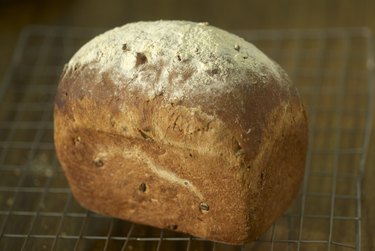
Fungus belongs to the kingdom Fungi, bacteria to Monera and protists to Protista. Although these organisms are often thought to be detrimental to human health, many of them actually exist in the foods you enjoy, as well as on the body itself. The body, however, is equipped to maintain a healthy balance of both bacteria and fungus.
Bread
Video of the Day
Leavened bread contains yeast, which is a common fungus both inside and outside the body, as well as an effective organism for making bread rise. Yeast functions by metabolizing the simple sugars of the dough. The byproduct of the metabolic activity is carbon dioxide and alcohol, which in turn causes the bread to rise. This process of fermentation also strengthens and develops the gluten present in the dough, while also contributing flavor of the bread.
Video of the Day
Yogurt
Plain yogurt is one of the healthiest products you can consume, according to the Mayo Clinic. It usually has probiotics added to it, which act as "good" bacteria, helpful in keeping the balance between their "bad" counterparts. The common bacterial types within yogurt include Lactobacillus delbrueckii, Streptococcus thermophilus and Bifidiobacterium. Each strain is able to survive within the digestive gut aiding in digestion to improve regularity. The National Institutes of Health says that this survival is key to the role of probiotics, and significantly improves digestion in those who normally consume yogurt.
Miso
Miso contains both fungi and bacteria. According to the University of Hawaii's Department of Botany, manufacturing miso requires the use of the fungus Aspergillus oryzae that incubates within the miso during the fermentation process. The Association for Asian Research says that miso contains B12-synthesizing bacteria, which eat lactic acid, and enzymes that aid in digestion and food absorption.
Seaweed
Seaweed is a multicellular protist and considered a brown algae, according to the University of Cincinnati Clermont College. Seaweed is an excellent source of iodine, which is necessary for a properly functioning thyroid gland. The seaweed Porphyra umbilicalis is a staple food item in Japan, called nori or purple laver, procured by drying out the algae and lightly salting it. The Food and Agriculture Organization of the United Nations says that this nori is the most nutritious form of seaweed, with a protein content of 30 percent to 50 percent.
Is this an emergency? If you are experiencing serious medical symptoms, please see the National Library of Medicine’s list of signs you need emergency medical attention or call 911.